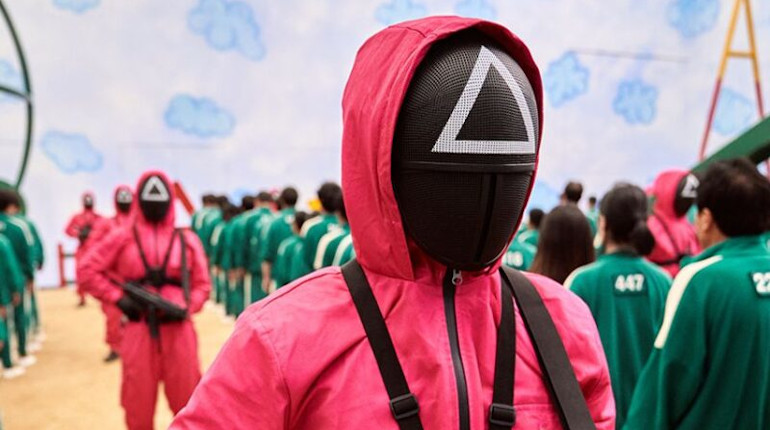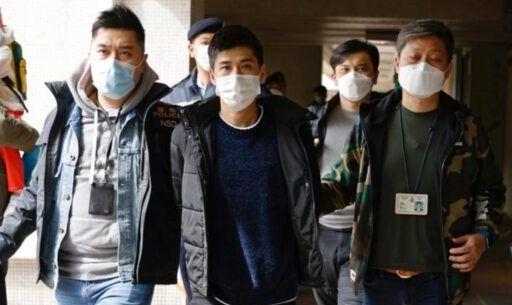Finn McKenna is a member of the Socialist Party (ISA in Ireland).
*Spoiler alert throughout*
Squid Game has the entire world talking. The series based in South Korea is the most watched show on Netflix of all time; 110 million Netflix viewers have streamed the show. Considering the series was only released on September 17, this ascent is monumental. The question is: Why?
It is a commentary on our fractured world that’s rife with oppression and inequality
Squid Game resonates with people for a multiplicity of reasons. The script is intelligent, the characters are multi-faceted and complex, and the situation in which the characters find themselves is quite novel for many viewers (although some Battle Royale fans have correctly identified similarities). The broader social context is also stimulating discussion, with the creator, Hwang Dong-hyuk, explaining that he wished to create a series that acts as a fable or allegory for modern capitalist society.
The protagonist, Seong Gi-hun, is a down-and-out ne’er-do-well gambling addict on a downward spiral. He’s in a rut, stuck living in cramped conditions with his mother. Seong Gi-hun is haplessly broke and is constantly coming up against (and failing to overcome) life’s vicissitudes. Any stroke of luck he experiences when gambling is cut short through his gambling debts catching up with him in the form of predatory loan sharks or by getting pickpocketed. Following a bad day of gambling, losing money and disappointing virtually all his immediate family, he is invited to play the game by a pristinely dressed recruiting agent, allured by the promises of financial stability and great riches.
It’s about the challenges of survival both inside and outside of the Squid Game
The Squid Game journey really begins when contestants are taken to an otherwise uninhabited island off the coast. Here, the Squid Game facility is full of mysterious operators of the Game — all donning pink suits. A hierarchy exists among the operators, which is discernible by the various shapes on their masks. All 456 contestants are instructed to wear green tracksuits. This is emblematic of the supposed equality that exists within the Squid Game.
It is soon revealed through the experience of the first game what this contest entails: a brutal series of six games in which contestants must complete while abiding by strict rules or they will be killed. The sole winner takes home a huge sum of money.
Throughout the game, the operators remind the players that existing within the structure of the game are the pillars of democracy and true fairness. The term “equality of condition” is spoken of. A surface-level examination could permit and accept such an assertion. Below the surface, however, lies the essence of the game and a deep-sea dive into the internal and external dynamics of the participants’ lives disproves any real notion of equality and fairness in the game.
The surviving contestants are traumatised and in shock following the completion of the first game, a very bloody version of Red Light, Green Light. In the middle of the panic, one of the competitors recollects a clause in the contract which guarantees the right to exit the Squid Game (albeit empty-handed) if a majority votes to discontinue the game.
By one vote, a majority is formed with all the (then) surviving players. They are subsequently escorted out of the Squid Games, traumatised and vulnerable, ready to return to their precarious lives on the outside.
Once out in the rat-race, death-race, cut-throat capitalist society of South Korea, the lives of the Squid Game participants fall into immediate disarray. Seong Gi-Hun’s family life is falling apart, and he faces the prospect of his daughter emigrating to the US with her mother and her stepfather. Not only that, but he also finds his aging mother sick and in decline. She needs healthcare, but she simply can’t afford it.
This correlation of factors amongst others compels Seong Gi-Hun to return to the Squid Game. There he finds his childhood best friend, Choo Sang-Woo, back to complete the game. Life on the outside for Choo Sang-Woo has crumbled. Once the pride of his neighbourhood for making it big in commerce, the cream of the crop has now fallen into disgrace with the state authorities for embezzlement and corruption. This is a reminder that even those in the capitalist class can find themselves cast out and their lives destroyed by the system that elevates them to obscene ostentatious heights. Such is the nature of the gamble.
Choo Sang-Woo appears to be the exception. The vast majority of the Squid Game participants are economically coerced into returning. Poverty is an integral part of the experience of the working class, and unemployment and complete deprivation is just a stone’s throw away for most workers.
The question then arises: is this really a true choice if circumstance has compelled the vast majority of down-and-out, impoverished, struggling players? If the answer is no, as this reviewer believes, then the appearance of the Squid Game as a great leveller is ultimately a lie. Ultimately, most Squid Game players are coerced into playing the game by the real threat of absolute poverty.
It shows many sides of human nature
What fascinates this reviewer is how Squid Game, through its use of diverse and complex characters, and through placing these characters in life-and-death situations, can paint a picture of how fluid the nature of humanity is.
A cynic could watch Squid Game and extrapolate that it confirms the worst tropes about the negative nature of humankind. Such a cynic would surely draw upon the vicious fight scene which saw a gang around hardened criminal and psychopath, Jang Deok-Su, carrying out dozens of premeditated murders against fellow contestants, to give one example.
To fall prey to cynicism or to project a negative view on the show would starve the viewer of the opportunity to learn a profound truth about humanity: human beings will behave in particular ways depending on the situation that they find themselves in and based on the sum total of their human experience up until that point.
Jang Deok-Su willingly led a vicious death squad that targeted other human beings for ruthless, monetary gain. However, Jang Deok-Su’s life pre-Squid Game was one where he had already displayed a propensity for violence and a killing-rage.
Choo Sang-Woo gets other people to buy into his plans, then stabs them in the back. He is cold and calculating and self-interested. Where did he learn this behaviour? Most likely in his high-flying finance job, where the dog-eat-dog competitive mentality is venerated.
Furthermore, people operate in line with what they need to do to survive. The game’s pink-suited operators are a fine example of this. On the one hand, it can be argued that they symbolise the banality of evil — that when it comes down to it, they will carry out the deathly acts demanded of them by the rules of the game because that’s their job and they appear to do so unquestioningly.
However, we need to take a deeper dive here. At the end of the honeycomb game, a young operator in his late teens is taken hostage by a contestant who’s facing execution. The young operator is instructed to unmask himself at gunpoint. Doing so reveals his youth, and the shocked contestant is both stupefied and disturbed at how young the operator is. The ominous Frontman appears and immediately executes the mask-less operator, for in revealing his identity he has disavowed the rules of the game, even if he did so under coercion.
The untimely and cruel end of the young operator is worth examining not just as an isolated event but in relation to the wider societal context outside of the Squid Game. Why was a boy so young involved in a killing game? Was he trafficked into this game? Did he enter of his own volition? Was he some kind of economic conscript? These questions are likely to remain unanswered, but such questioning serves as a useful exercise in recognising that even the operators, who are fully complicit in the heinous structural violence of the game, are doing their job and may feel that they are doing so out of broader systemic coercion.
Should we contrast the actions and behaviour of the gangster Jang Deok-Su with the worker Ali we would see polar opposites. Ali is recurrently a literal lifesaver and is always open to the idea of working in teams to survive the horrors of the Squid Game. Ultimately, he is betrayed by fallen businessman Choo-Sang Woo who cons Ali in the fourth game, cheating Ali and leaving him to face his sudden death sentence.
In fact, we can see conflicting and contradictory behaviours within single characters. Take for example Han Mi-Nyeo, Jang Deok-Su’s short-lived lover. At times she is violent and conniving, operating with Deok-Su’s gang and going on a killing-spree. In other moments, she appears weak. She is the only character who is left partner-less before the Marbles game. Other times we find her scolding the operators — an action that the vast majority of players simply wouldn’t countenance doing for fear of being killed by the operators. She ultimately commandeers her own destiny when she kills Jang Deok-Su (and herself in the process), having promised him that she would gain revenge following his abandonment of her previously in the games.
Squid Game shows that humanity is not a monolith and that human behaviour, even in an intense struggle to the death, sees a wide range of differing actions and feelings that need to be understood both in the immediate context of the characters and in the longer view of how humanity is formed and moulded by the society that we all grow up in.
The VIPS mirror the real-life predatory billionaire class that rule the world
Later in the series, the audience are introduced to a bakers’ dozen of billionaire tycoons who have come to watch the final rounds of the Squid Game in person. These spectators of violence are reminiscent of several types of ruling-class parasites, both contemporary and historic. One is reminded of the Roman emperors and patricians who cheered on and revelled at the violence and death of gladiator matches.
Moving back to the present day, we can draw a parallel between these predatory billionaire characters and those that exist in real-life who offered a model for the ideology of the VIPs, namely Prince Andrew, Jeffrey Epstein, Harvey Weinstein and so on.
As argued earlier, there is no real fairness or justice present in the Squid Game. Enter the VIPs and their relationship with the Squid Game. Given the status and wealth that these oligarchs possess (earned through exploitation and gambling), these vultures would never have found themselves compelled to play the Squid Game. After all, why would they? The world is their oyster, and the Squid Game is pretty much their day at the races, where a cynical life or death million-dollar bet on the survival of contestants is an inconsequential drop in the ocean of their vaulted wealth.
Contrast the grandiose existence of the VIPs with that of the contestants. We need to remember that following the first game of Red Light, Green Light, the majority returned despite having observed the slaughter of 200 people. One in a position of privilege could ask themselves “Why in heaven would anyone volunteer to go back?”
The point is most of the survivors returned as they estimated that the world outside was even worse, and this was the one true chance to escape the slings and arrows of crushing capitalist injustice and oppression.
Marx wrote in Capital that:
“(In capitalist society) Accumulation of wealth at one pole is, therefore, at the same time accumulation of misery, agony of toil slavery, ignorance, brutality, mental degradation, at the opposite pole, i.e., on the side of the class that produces its own product in the form of capital.”
This is the context that needs to be borne in mind when watching the relationship between the VIP pundits and the participants who are plummeting to their deaths. Squid Game is neither sheer randomness nor a great leveller, but organised savagery that exists in the darkest underbellies and far-corners of a system that drives people to such desperate extremes.
Squid Game resonates because so much of it represents reality
The circumstances which drove the participants to put their lives at risk are circumstances that much of the world finds itself facing today. South Korea is currently plagued by one of the worst debt crises in the world, the burden of which is anchored onto its working class. Before the Squid-Game, Seong Gi-Hun was not always a gambler and a failing family man. At one point in the recent past he was employed in a car factory. He lost his job due to the irresponsibility of the owners. Up until that point he had stability in his life. The system, however, shredded this stability when he lost his job. The director of the series has mentioned that this sub-plot is based on real-life events in a South Korean car manufacturing plant – the auto strike at Ssangyong Motors.
The ending of the show is poignant. The ruthless, winner-take-all finale of the game leaves the audience reeling. The last man standing, Seong Gi-Hun, is plagued by guilt and depression despite all the wealth he took home. The sheer misery and violence that he saw in the game weighs on his spirit. It is implied that Seong Gi-Hun becomes a good-guy billionaire, a trope that is often sold to the masses of people by the incarnations of Bruce Wayne (Batman) and Iron Man.
For this reviewer, who binge-watched the whole series in a twenty-four hour period, interpretations of the ending are not the most important thing. The take-away message from Squid Game is how it has appeared in a certain moment in the decay of capitalist society. The fact that it resonates so much with tens of millions of people worldwide speaks to a widening anger and alienation felt by the masses of people who live under this inhumane, Earth-destroying capitalist system. This should inspire all those who hope for a fair and just world. It is a reminder that many millions of people around the world desire the same change. This is the power inherent in Squid Game.



